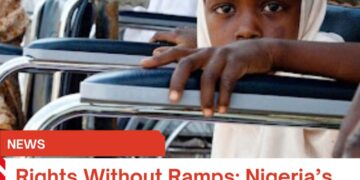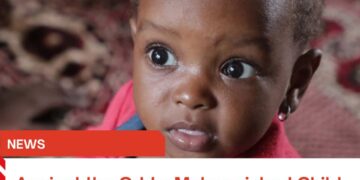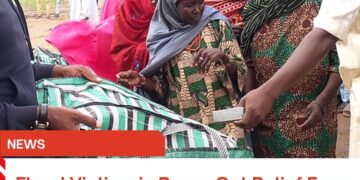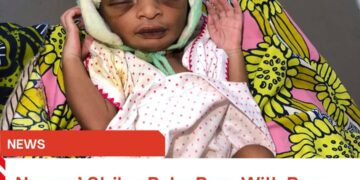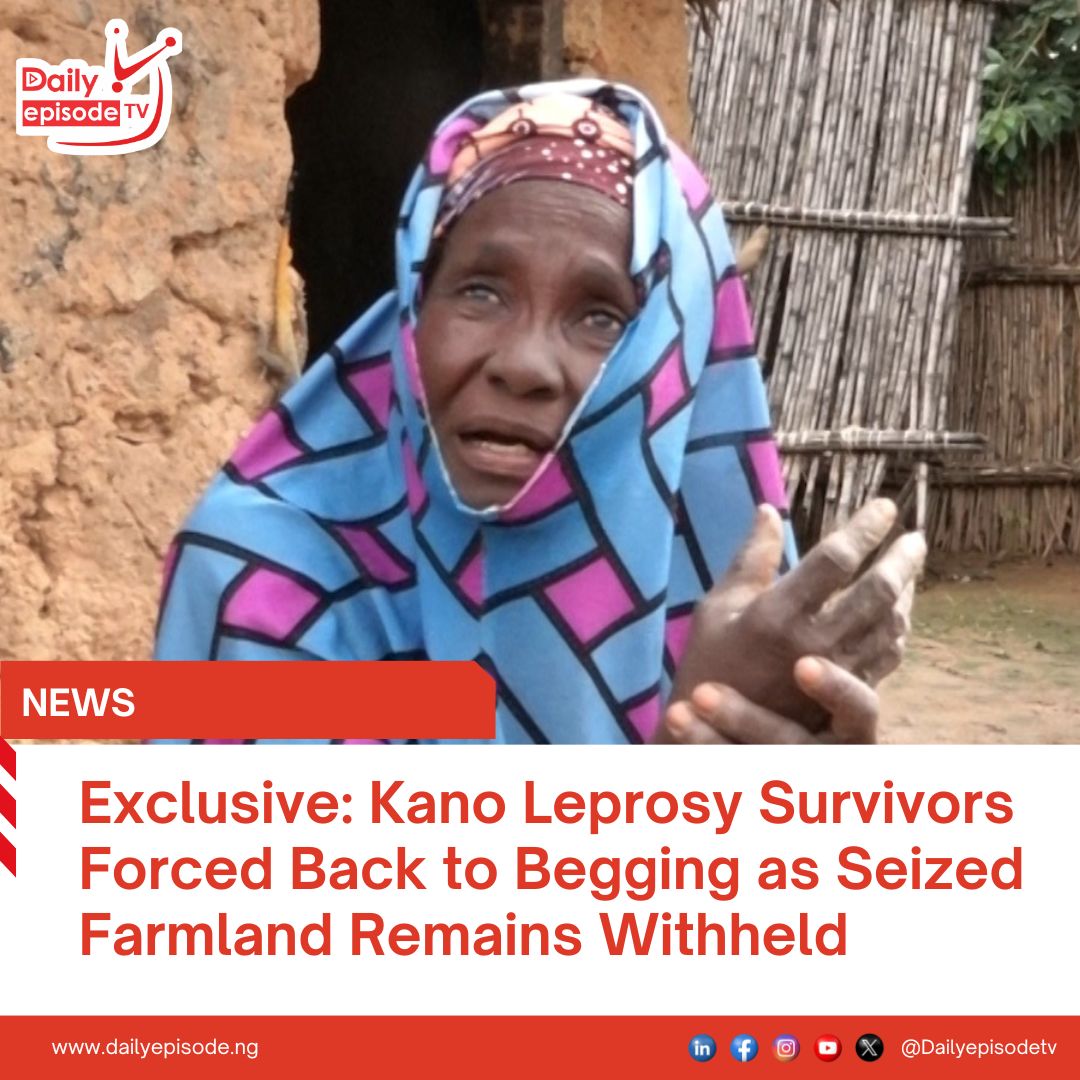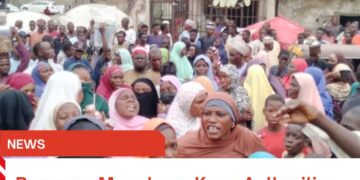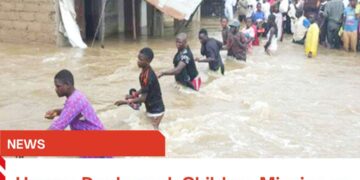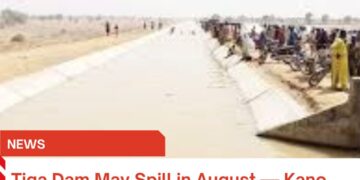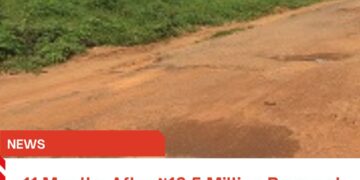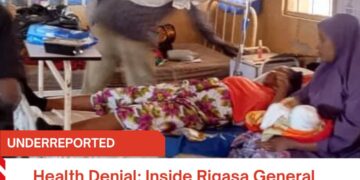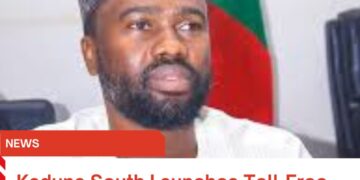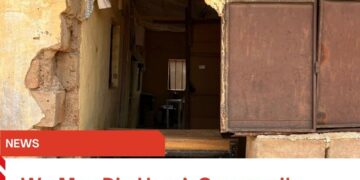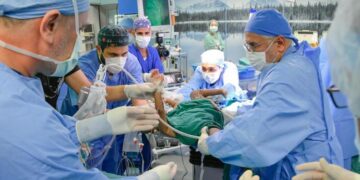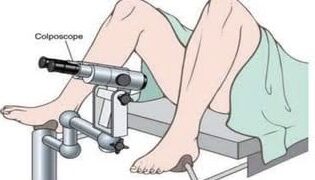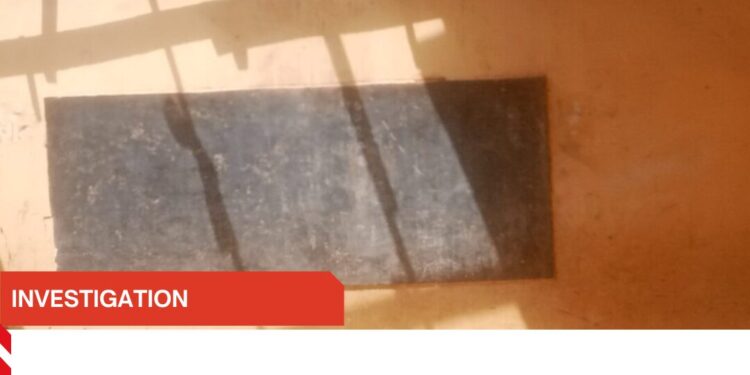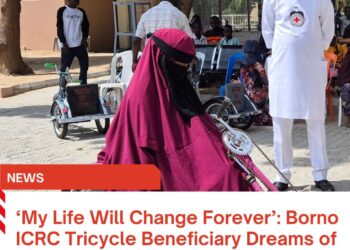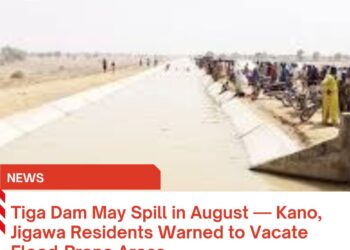Marred by government negligence fueled by lack of an education sector plan (ESP), boys with special needs in Gombe are struggling to learn in a neglected, unconducive, and insecure special school, reports Muhammad Auwal Ibrahim.
In a small, crumbling classroom in Gombe, *Adam Talle sits hunched over his slate, with his stylus scratching against the surface as he carefully forms his notes. It’s just past 10 a.m. on a Friday morning and instead of listening to a teacher, he is left to study on his own. Staff shortages mean that many classes don’t hold as scheduled, so Talle fills the silence by writing his English notes and chatting with classmates.
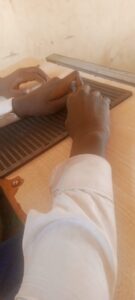
When he first arrived at the school in 2015, he had been told the government would take care of him. As a student with special needs, he believed he would be provided with everything necessary for his education. But years later, reality has proven far different.
Without essential items like canes, proper writing materials, or even nutritious food, they are left to fend for themselves. Talle is among the lucky ones. His parents do what they can to support him. But for many other boys, they lack the financial means to buy the materials they need, which in turn they miss exams, fall behind in their studies, and eventually drop out.
The neglect is obvious. The school, meant to cater to children with disabilities, is in a state of disrepair. Classrooms are dilapidated, and the impact of climate change (blown off roofs and soil erosion) has only worsened the situation.
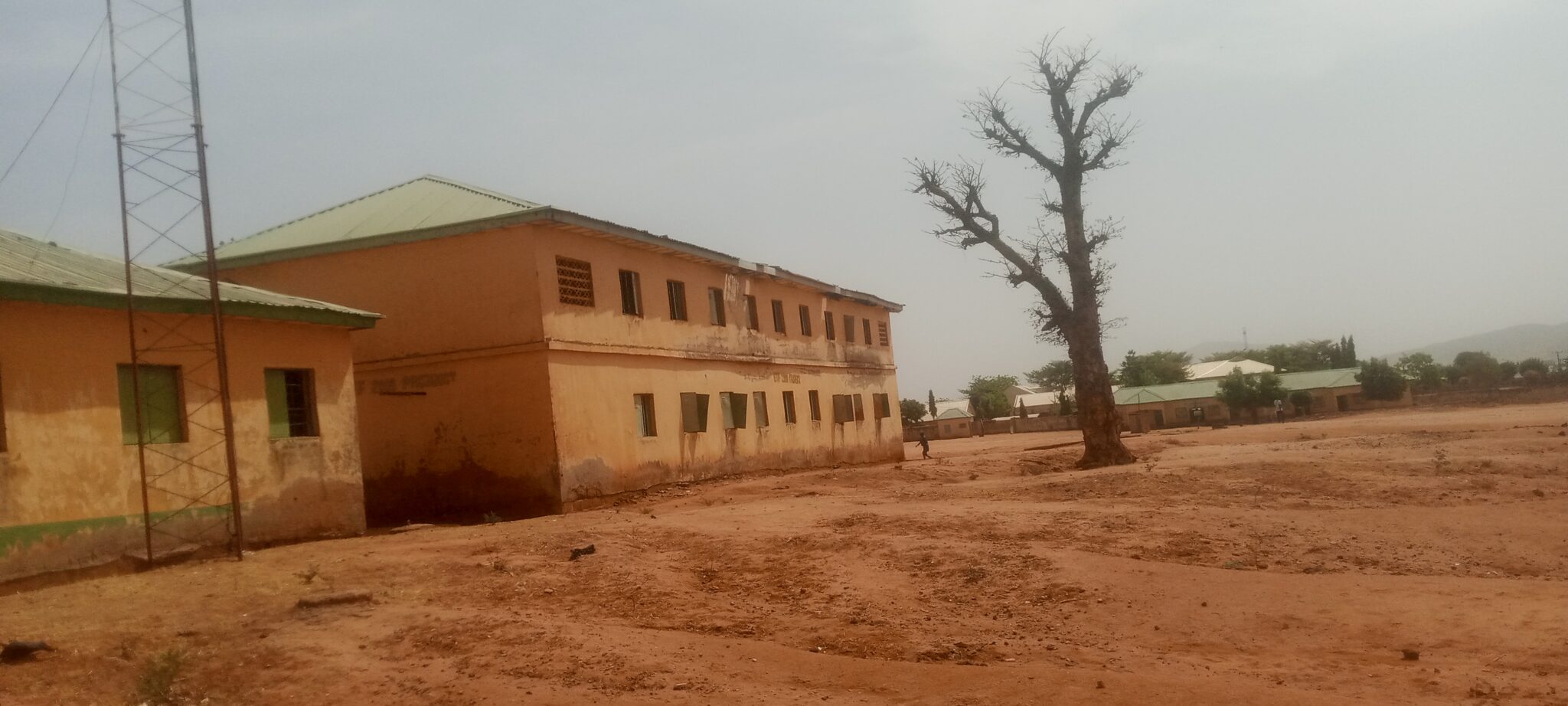
“We lack enough classrooms, and the rainy season makes it even worse by affecting our roofs,” he laments, recalling their dire condition. “Here, this is Primary Six. JSS 1 is just to the right, and JSS 2 is in the front. We all share this class.”
Without an Education Sector Plan (ESP) in place, the government’s failure to support these boys has only added to Gombe State’s growing population of out-of-school children. Parents who can’t afford to fill in the gaps left by the government are forced to make impossible choices, pulling their children out of school entirely.
For boys like Talle, the dream of an inclusive education remains just a dream.
Scary Statistics
According to data obtained by Halal Reporters from the State Ministry of Education, there is a low level of inclusiveness in enrolment, a shortage of trained special needs teachers, inadequate disability-inclusive infrastructure, a lack of instructional materials, and insufficient provision of assistive technologies.
The data reveals that the total enrolment of pupils and students in special needs schools in Gombe State stands at 1,804 (comprising 946 males and 775 females).
The data on the enrolment of children with special needs in pre-primary/primary is 1,429 (818 males and 666 females), in JSS 183 (98 males and 84 females), and in SSS is 192 (30 males and 25 females).
Government Negligence
When *Tanimu Sallau requested for writing materials, he was told to wait until they were provided. But after following up, he was advised to ask his father to purchase them instead.
“It cost me ₦15,000 to buy the materials myself,” he said. “If my father wasn’t financially stable, I wouldn’t have been able to afford them.”
For more than half a decade, students like Sallau struggled not just with a lack of learning materials but also with inconsistent teaching. Staff shortages and institutional negligence mean that having all teachers present in class is a rare occurrence.
The story is the same for Talle. Since the administration of former Governor Dankwambo, he has not received a single writing material, cane, or typewriter from the government. “We don’t have any,” he said. “Unless you can afford one yourself.”
*Danladi Mudi, like many other students interviewed by Halal Reporters, navigates the school’s rough terrain without a cane. He moves carefully, fully aware of the risk of falling in an environment that is not friendly even to able-bodied students.
“I am just one of hundreds of students without a cane,” he lamented. “At night, moving around becomes even more difficult.”
For Mudi, the struggle goes beyond mobility, he has no cane, no writing materials, and no government support. Since enrolling, he has relied almost entirely on his parents, who lack the financial means to provide for his special needs.
He is caught between life and death, left to take care of himself in a system that has failed him.
The situation is not different for *Danjuma Liti, who enrolled in 2023. He normally retires from class at 9am because that’s when classes usually stop. “Because of staff shortage, we don’t even have a government teacher. When it’s time for the WAEC exams, we have to skip that paper.”
A source familiar with the school’s condition, who spoke anonymously, confirmed the dire state of resources. “The school doesn’t have a resource room,” he explained. “No braille books, no braille machines, no typewriters, no talking books, no audiometric machines. Nothing.”
“Students rely solely on slate and stylus, which their parents have to buy because the government doesn’t provide them,” he added.
For these pupils, the government’s promises of inclusive education remain unfulfilled.
Hunger Bites Harder
Recently, rumors circulated that students in a public boarding school in Gombe had died from hunger and malnutrition. While the Commissioner of Education dismissed the claim, a visit by Halal Reporters to this special school revealed a similar crisis, students battling hunger and malnutrition.
Liti shared how some students are forced to fast during Ramadan without suhoor (pre-dawn meal). “The food is so bad that we rather drink garri with sugar than eat what they serve,” he said.
Each time school resumes, students brace themselves for monotonous and barely edible meals. They claim they are served the same food almost daily, and if they want variety, they have to buy it themselves.
*Hamisu Lawal, a senior student, described the struggle. “Whenever food is served, some of us don’t even get any because it’s not enough. And when we do, it’s usually just swallow and baobab soup. We only get rice once in a while.”
Once upon a time, three vehicles delivered food supplies to the school. Now, only a single tricycle carries what is provided, an alarming decline in government allocation.
A source familiar with the situation, acknowledged the problem but claimed there has been some improvement. “When food prices rise, we experience shortages. But now that prices are stabilizing, the situation is improving,” he said.
Despite this, for many students, the reality remains unchanged. Hunger is part of their daily routine, and the promise of proper nutrition is still far from being fulfilled.
Learning in Shackles
The school is anything but not disability-friendly. High classroom entrances, worsened by erosion, make mobility a daily struggle for visually impaired students. The risk of falling is ever-present, but this is Nigeria, and they have no choice but to cope.
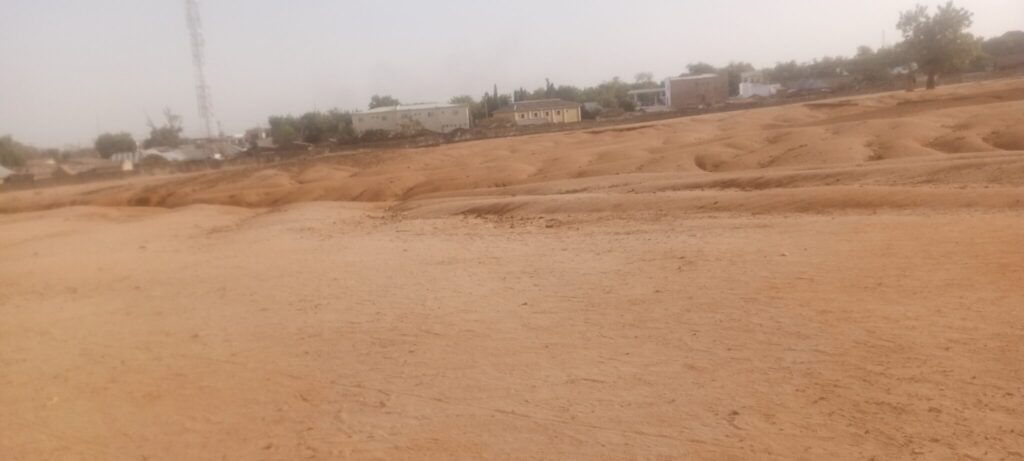
Beyond accessibility issues, the infrastructure itself is in ruins. The dilapidated buildings, with leaking roofs, stand as evidence of years without renovation. For visually impaired boys, navigating these deteriorating spaces is an added burden.
Inside the classrooms, broken desks, shattered windows, and poor learning conditions add to the challenges. In the hostels, conditions are even worse. Only hearing-impaired students have access to electricity, while visually impaired students are not connected to the national grid.
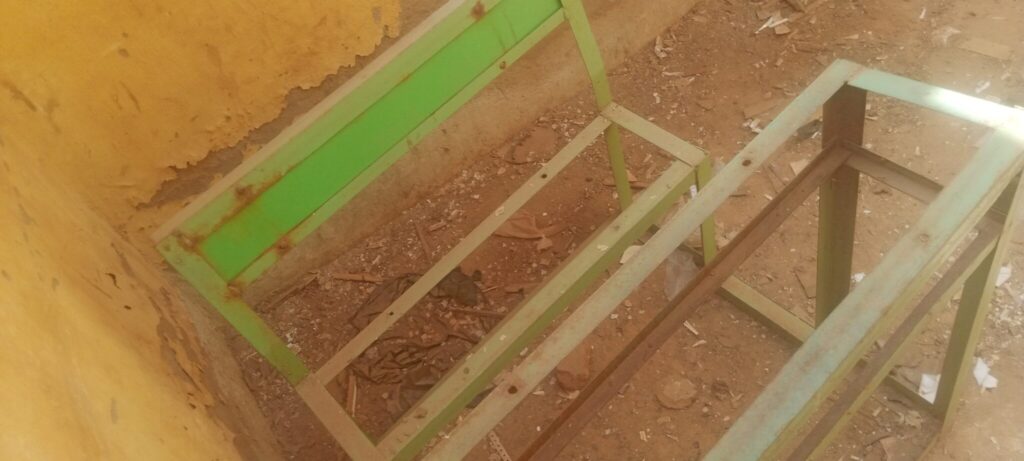
The challenges extend beyond poor infrastructure and accommodation. *Kalla Bala, a student, lamented that they only study Mathematics, English, Civic Education, Islamic Studies, and Hausa, out of the broader subjects required.
“I am calling on the government and well-meaning individuals to look into our condition,” he pleaded.
Data of the Gombe state teacher-pupil ratio, shows that the ratio is extremely high at the pre-primary level, somewhat high at the primary level, and relatively lower at the JSS and SSS levels.
The qualified teacher-pupils ratio in pre-primary schools is 1:242; qualified teacher-students ratio in primary schools is 1:61, qualified teacher-students ratio in junior secondary school is 1:35. The data also revealed that at senior secondary school level it seems to be low; teacher-students ratio in senior secondary schools is 1:30 which may be due to low level of students’ enrolment at this level.
A source familiar with the school disclosed that out of 48 staff members, only nine are well-trained in special education.
Adding to their frustration, students report that this term, they have had only one or two lessons in some subjects. With exams approaching, anxiety is growing over their ability to prepare
As if all these weren’t enough, the school’s clinic has become non-functional. When students fall sick, they have no choice but to visit patent medicine stores outside the school, buying medications they can barely afford.
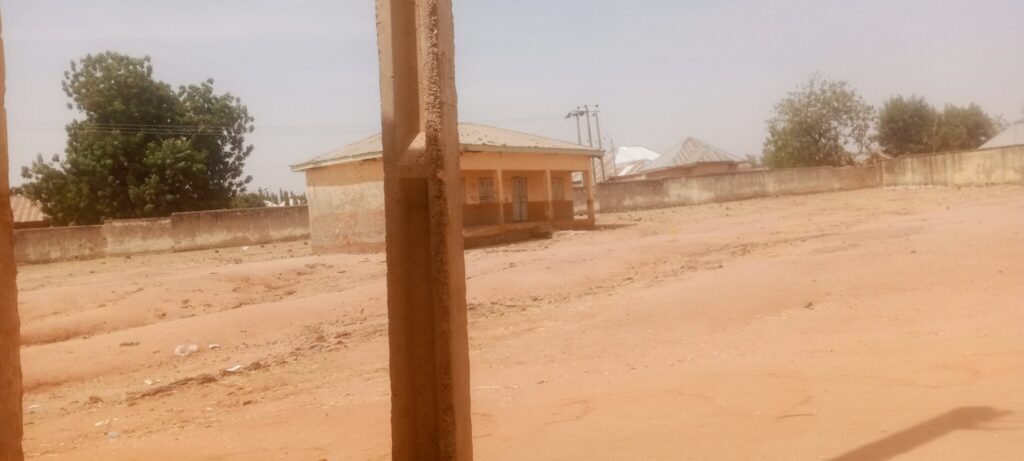
For them, education comes with hurdles at every turn. Hurdles that should not exist, but do, simply because they were born different.
Horrible Hostels, Security and Safety Threats
At the end of the day, when students retire to their hostels, they are met with yet another layer of hardship: security threats, inadequate bedding, and unbearable sleeping conditions.
Things as essential as a mattress are not for the children with disabilities.
The few mattresses available are so old and worn out that there is little difference between lying on one and sleeping directly on the metal bunks. Even then, there aren’t enough beds. Many students are forced to share, with two merged into a single bed. Those who can’t find space either go home after classes or, if the distance is too far, drop out entirely.
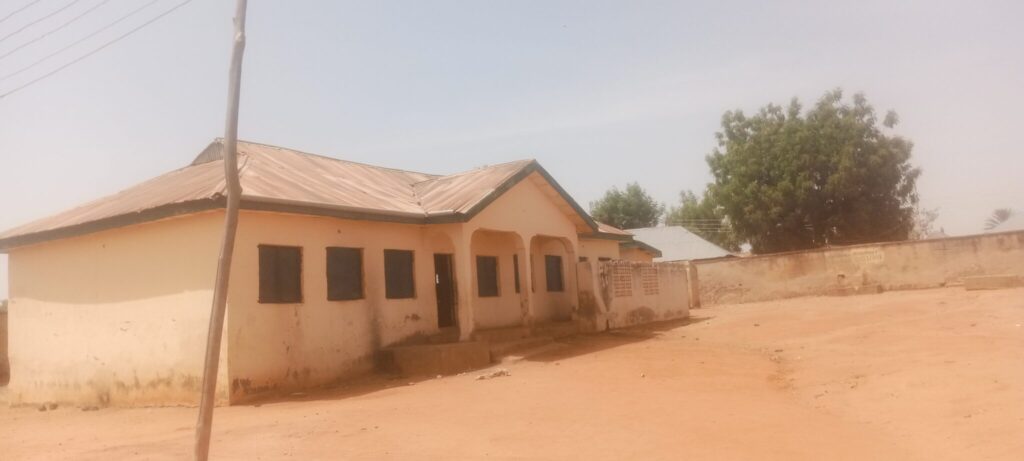
To make matters worse, students say the school rarely allows them to bring their own mattresses, except in rare cases, leaving them with no option but to squat.
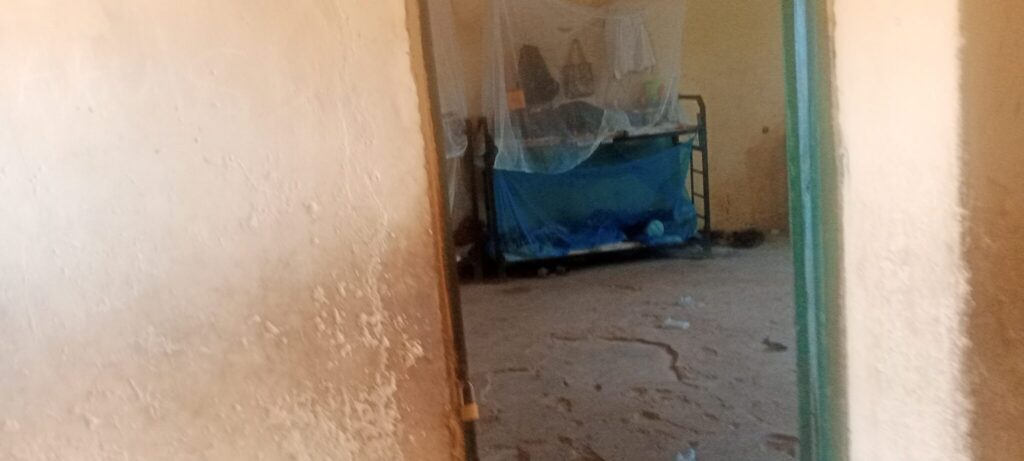
Even after enduring hunger, poor infrastructure, and a lack of essential resources, students still face yet another ordeal, constant attacks from intruders. Time and again, they fall victim to harassment and robbery by suspected Yan Kalare gang members, a notorious criminal group in Gombe. Their presence has turned the school into a home of fear rather than learning.
At night, these gangs take over the classrooms. Lawal recalled an evening when he and his classmates were denied entry for prep. “We told them we needed to study, but they laughed and said they were also reading,” he said, adding that a strong smell of weed filled the air.
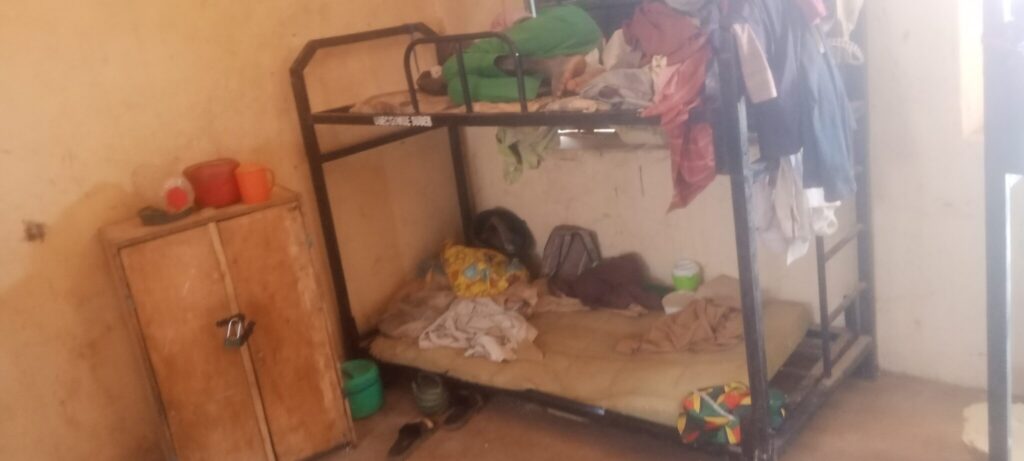
During Halal Reporters’ visit to the school, there were no security personnel at the entrance. Anyone could walk in and out freely, including intruders and passersby. Students noted that even when the school’s security guard is present, his age makes him incapable of stopping the attacks.
The attacks have also reached the hostels. Sallau recalled how the gang stormed their hostels. “When we protested, they insulted us,” he said.
Talle, described the situation, “Nowhere else in the world is like this school. It’s where the violent gangs that terrorise Gombe come to fight. The police patrol here all the time.”
The fear is real. “One day around 2a.m., we heard them (Kalare boys) fighting outside,” a student recounted. “Knowing the weak state of our hostel doors, we panicked. Some of us hid under our beds. Thankfully, they didn’t break in.”
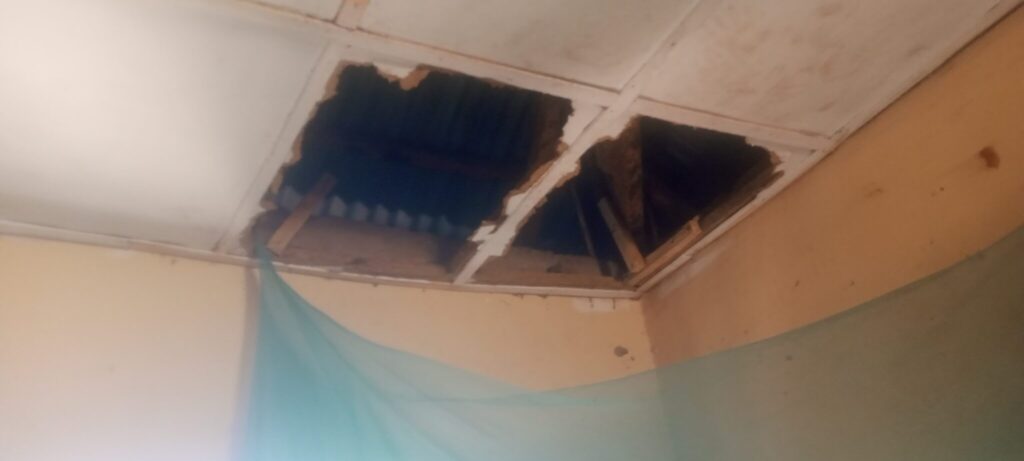
Not all days were fortunate. “Last term, I was robbed in my hostel,” he shared. “They held a knife to my neck, and I had no choice but to hand over my phone. When I asked for my SIM card, I got a dirty slap instead.”
A source in the school confirmed these security lapses to our reporter and urged the government to intervene. “For our safety, we need security personnel, both during the day and at night,” the source stated.
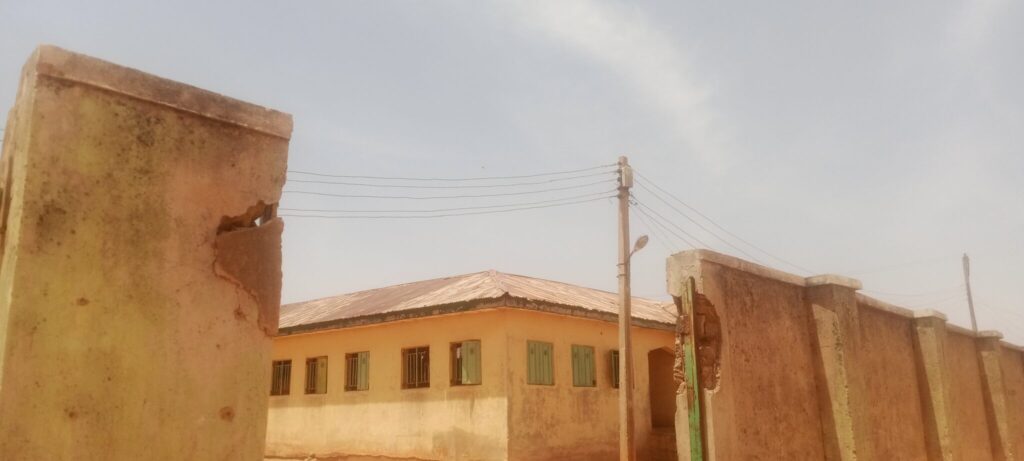
For now, the students remain trapped in a vicious cycle of fear and vulnerability, hoping for a change that may never come.
Changing Climate, Worsening Conditions
In the heart of Gombe town lies this school, near the Arabic Teachers College. This special school should ideally be a model of inclusivity and accessibility. But its proximity to the city and modern infrastructures have done little to change the grim reality within its walls
Founded in 1996, it remains the only school for children with special needs in Gombe state. This means that for all the 11 LGAs and even neighbouring northeastern states, only one school caters to the educational needs of students with disabilities, How is that even acceptable?
The school serves both boarding and day students (both male and female), totaling about 600, with students coming from across the Northeast region.
The climate crisis has only made things worse. Heavy rains, strong winds, and even vandals regularly damage the structures, forcing the school to constantly shift students from one classroom to another. In some cases, three different classes are crammed into a single venue, with multiple teachers conducting lessons simultaneously. How is a special needs child supposed to learn in such chaos?
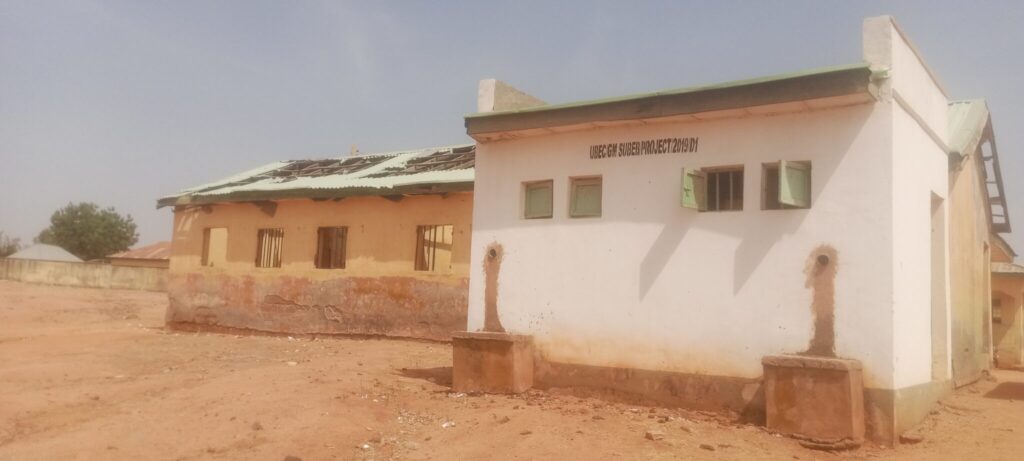
Erosion has taken its toll on the school, making movement increasingly difficult. Even persons without disabilities struggle to navigate the environment, let alone those with special needs. Their concerns are not just valid—they are urgent.
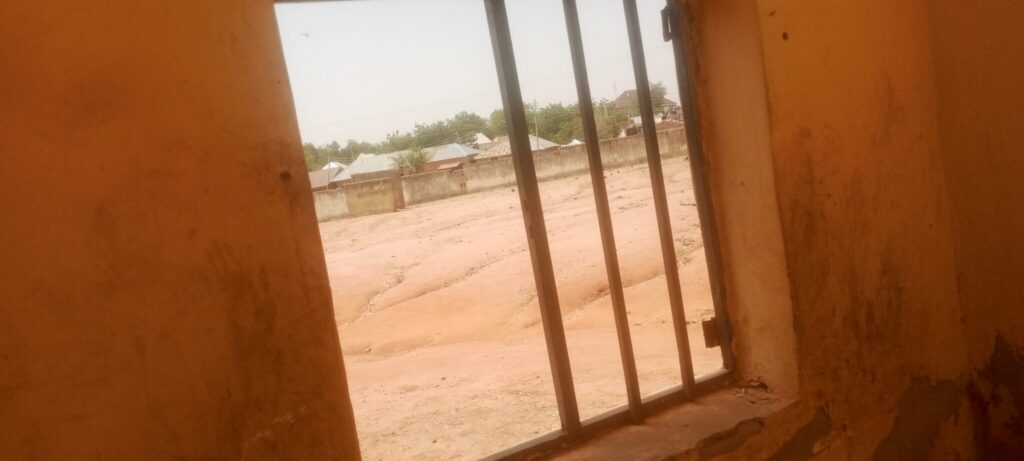
For students with disabilities, an unconducive environment, worsened by government neglect, leads to two inevitable outcomes: dropping out or poor academic performance. Sadly, this pattern of negligence is not unique to Gombe, it is a reality across Nigeria, from the north to the south.
Inadequate Water, WASH Facilities, Stigma…. The Struggle for Water
Visually impaired students in the school are left to fend for themselves, carrying out daily activities just like those without disabilities. They fetch water, wash their clothes, and collect food from the kitchen, all without the necessary support.
But the real crisis lies in the government’s failure to provide a reliable water supply. At times, students have to go as far as Amal Bakery and Alhajin Yara Plaza in search of water. Crossing an express road without canes or guardians? “There is no other alternative if you don’t have money to buy from vendors,” a student said.
Does government neglect of children with disabilities really run this deep? It may seem unbelievable, but Halal Reporters’ has observed visually impaired students moving in groups, risking accidents, falls, or losing their way, all without canes, just to fetch water.
For students in the school, access to water is a daily challenge. The borehole drilled by a philanthropist only functions when there is power supply or they have to go out. “Other times, we go to Resource Centre. If that fails, we buy from vendors over our hostel wall at ₦50 per jerrycan,” recalls Talle.
Mudi once missed a step and fell into a culvert while on his water-fetching routine. His jerrycan was damaged, and he suffered injuries. This reality exposes the sheer negligence of public education for children with disabilities in Gombe, the capital city of Gombe State.
Beyond the physical struggle, students also endure stigma when searching for water.
“We face insults from residents of London Mai Dorawa whenever we go there,” he lamented. “If we are lucky, after enduring their abusive words, they eventually give us water.”
The frustration runs deep. “I am calling on the government to fear God and remember that we have rights as Nigerian citizens. If they fail to renovate our school and address our suffering, they will explain to Allah on the Day of Judgment,” he passionately called.
A school source confirmed to this newspaper that although the borehole was a welcomed relief, the lack of consistent power supply remains a major barrier to accessing clean water.
“But we used to pump water to our reservoir near the kitchen and female hostels,” the source said.
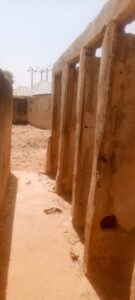
Perennial Problems
During Halal Reporters’ visit, the severity of the school’s perennial problems became clear. The first thing that greets any visitor, especially near the toilets, is bad odour, a sign of an unhealthy and unhygienic environment.
Left without caregivers and cleaners, the school environment, especially hostels, portrays how difficult It is for a visually impaired person to keep it clean.
Despite being the only special needs school in Gombe, students still use “overflowing” pit latrines, putting them at serious risk of disease.
This newspaper observed that the school was not built to cater for the persons with disabilities. The visually-impaired seem to be the most vulnerable in the school. While hearing-impaired students can see, those with visual impairments cannot navigate the school’s dangerous terrain. They study in classroom blocks, dilapidated and roofless, while the hearing-impaired students are lucky to have at least better ones.
Beyond the boys’ struggles, the school is unfit even for able-bodied persons, let alone those with disabilities. Alarmingly, visually impaired girls have suffered multiple attempted sexual assaults in their hostels due to the school’s lack of security.
Why GRESP?
The lack of an Education Sector Plan in Gombe state compounds the existing challenges. The challenges facing the children with special needs are the consequences of operating without a State Education Sector Plan (SESP), let alone a gender-responsive ESP.
GRESP is a crucial policy tool designed to address gender barriers in enrollment, retention, transition, and completion rates. It provides a roadmap for governments to ensure equitable and inclusive education.
This policy is essential for guiding the actions of any serious government committed to improving access to education. However, Gombe State has been operating without such a policy for some time. While the state is in the process of developing a new sector plan for 2025–2034, it is crucial to fast-track the implementation process and ensure it is not gender-blind, unlike the previous plan.
Expert, Ministry React
Baba Machina, Communication Engagement Manager at Spotlight for Transparency and Accountability Initiative, urged the state government to ensure speedy implementation of the state education sector plan.
“A well-implemented education sector plan can address systemic issues by ensuring resource allocation, infrastructure development, and inclusive education policies. However, effective monitoring and accountability are essential to guarantee impactful execution,” he said.
“The government must urgently prioritise the welfare of visually impaired children by ensuring access to clean water, strengthening security measures, recruiting qualified staff, improving hygiene through better WASH facilities, providing adequate instructional materials and fortified nutrition, including sufficient milk, which is crucial for their well-being.”
Abdulmumini Umar Kwami, Director of Planning, Research, and Statistics, acknowledged the challenges and assured that the government is taking steps to address them, particularly through the development of a gender-responsive Education Sector Plan (ESP).
“It is a well-developed plan that, once implemented, it will cater for the needs of all,”
Regarding the special needs school, Kwami stated that efforts are underway to renovate the institution and improve its infrastructure.
*Names marked with an asterisk have been changed to protect the identities of the sources.
This story is produced as part of the Change Reporting Fellowship with support from ImpactHouse Centre for Development Communication and System Strategy and Policy Lab.
LIKE & FOLLOW US ON FACEBOOK, X, INSTAGRAM, LINKEDIN & YOUTUBE



